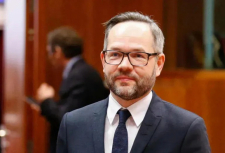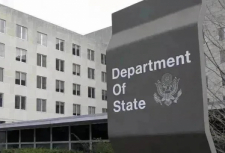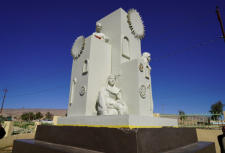Yezidis in ancient India, or Indians in ancient Mesopotamia?: Re-imagining Ancient Yezidi Origins

Mija Sanders University of Arizona, Tucson, USA
“War on Terror” and Other U.S. Political Narratives
The executive order for a travel ban was intended by Trump to be a “total and complete shutdown of Muslims entering the United States” but later became “extreme vetting” (Bier, 2018). Iraq was originally included in the ban. At the time when Iraqis were banned by Trump, the Mir’s wife was pleased with the decision, but disappointed that her son could not get married to his fiancé who was Iraqi and living abroad. Other Yezidis were sure that Trump would soon realize the vulnerable situation for Yezidis, and make a special policy for them to receive visas and migrate to the U.S. At the time of writing the visa restriction has been lifted for Iraqis but there has not been a large increase in mobility for Yezidis entering the United States. The difference between trauma narratives and anti-Muslim propaganda is a very important distinction, and I believe it is important for Yezidis to share their experiences in order to quicken mobility for refugees. However, it is important for advocates of victims of violence to keep an awareness of when and where those narratives can be used for propaganda to harm local immigrants, and prevent mobility for other refugees, such as Syrians. In India, for example, the idea of a Muslim “killer next door” is a widely discussed threat amongst Hindu nationalists. When I searched for articles comparing Hindus and Yezidis, I found a number of trauma narratives which aimed to use the Yezidi genocide to justify violence against Muslims in India, where Muslims are a minorityYezidis have been actively campaigning with Republican Party leaders for increased mobility for Yezidis to the U.S. In 2016 the Mir, traveled with a well-connected Republican Party political organizer to Nevada where he met with Republican senators and congressmen, and were scheduled to meet with Vice President Pence. Right-wing political participation by Yezidis who are anti-Muslim do not represent all Yezidis in the U.S., such as Yezidis in Nebraska, or the Texas based organization Yazda. However, it is Arizona Yezidis who are currently working towards becoming closest to the U.S. centers of power through the Republican Party. Yezidi leaders have met with VP Pence in Washington DC to address a large group of senators. Under the Trump Presidency over the past three years, they have focused on gaining the support of the U.S. government for the mobility of Yezidis to the U.S., and for weapons to ensure self-protection of Yezidi areas in Iraq, or in an area in the Nineveh plain claimed for autonomous rules by Yezidis called “Ezidxan.” In 2018 Vice President Pence redirected USAID funds in Iraq specifically for Christians and Yezidis (Morello, 2018). The funds are allocated for the rebuilding of Yezidi and Christian areas that were devastated by ISIS attacks. This decision has been criticized for redirecting funds in Iraq meant to help all displaced peoples solely to minorities (Tamkin, 2018). It has the potential to further alienate Christians and Yezidis from the local populations of displaced Muslims, challenging the peaceful re-integration of Iraqi communities in the future.
Tags:
Yezidis in ancient India, or Indians in ancient Mesopotamia?: Re-imagining Ancient Yezidi Origins

Mija Sanders University of Arizona, Tucson, USA
“War on Terror” and Other U.S. Political Narratives
The executive order for a travel ban was intended by Trump to be a “total and complete shutdown of Muslims entering the United States” but later became “extreme vetting” (Bier, 2018). Iraq was originally included in the ban. At the time when Iraqis were banned by Trump, the Mir’s wife was pleased with the decision, but disappointed that her son could not get married to his fiancé who was Iraqi and living abroad. Other Yezidis were sure that Trump would soon realize the vulnerable situation for Yezidis, and make a special policy for them to receive visas and migrate to the U.S. At the time of writing the visa restriction has been lifted for Iraqis but there has not been a large increase in mobility for Yezidis entering the United States. The difference between trauma narratives and anti-Muslim propaganda is a very important distinction, and I believe it is important for Yezidis to share their experiences in order to quicken mobility for refugees. However, it is important for advocates of victims of violence to keep an awareness of when and where those narratives can be used for propaganda to harm local immigrants, and prevent mobility for other refugees, such as Syrians. In India, for example, the idea of a Muslim “killer next door” is a widely discussed threat amongst Hindu nationalists. When I searched for articles comparing Hindus and Yezidis, I found a number of trauma narratives which aimed to use the Yezidi genocide to justify violence against Muslims in India, where Muslims are a minorityYezidis have been actively campaigning with Republican Party leaders for increased mobility for Yezidis to the U.S. In 2016 the Mir, traveled with a well-connected Republican Party political organizer to Nevada where he met with Republican senators and congressmen, and were scheduled to meet with Vice President Pence. Right-wing political participation by Yezidis who are anti-Muslim do not represent all Yezidis in the U.S., such as Yezidis in Nebraska, or the Texas based organization Yazda. However, it is Arizona Yezidis who are currently working towards becoming closest to the U.S. centers of power through the Republican Party. Yezidi leaders have met with VP Pence in Washington DC to address a large group of senators. Under the Trump Presidency over the past three years, they have focused on gaining the support of the U.S. government for the mobility of Yezidis to the U.S., and for weapons to ensure self-protection of Yezidi areas in Iraq, or in an area in the Nineveh plain claimed for autonomous rules by Yezidis called “Ezidxan.” In 2018 Vice President Pence redirected USAID funds in Iraq specifically for Christians and Yezidis (Morello, 2018). The funds are allocated for the rebuilding of Yezidi and Christian areas that were devastated by ISIS attacks. This decision has been criticized for redirecting funds in Iraq meant to help all displaced peoples solely to minorities (Tamkin, 2018). It has the potential to further alienate Christians and Yezidis from the local populations of displaced Muslims, challenging the peaceful re-integration of Iraqi communities in the future.
Tags:


























